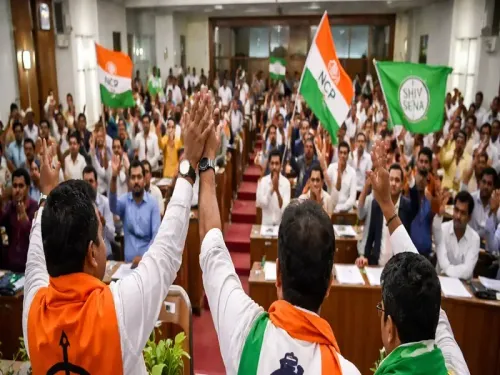Is Pakistan’s Bitcoin Deal Challenging IMF Regulations?

Synopsis
Key Takeaways
- Bitcoin deal between Pakistan and El Salvador raises concerns.
- Both nations are bypassing IMF regulations.
- Risks of money laundering and corruption increase.
- Trend towards multipolarity in global finance.
- Potential for conflicts of interest in government partnerships.
New Delhi, Sep 26 (NationPress) The recent Bitcoin agreement between Pakistan and El Salvador has ignited significant alarm as it illustrates how the embrace of cryptocurrency can enable emerging nations to circumvent IMF regulations amidst pressing global issues like money laundering and terror financing, according to a recent analysis.
The partnership formed by Pakistan and El Salvador arises at a pivotal moment where both nations are under IMF programs while simultaneously engaging in cryptocurrency initiatives that explicitly defy IMF recommendations.
After narrowly avoiding default in 2023, Pakistan is grappling with substantial financing needs, with the IMF projecting that the country will require over $100 billion in external funding by 2029.
Pakistan's $7 billion agreement with the IMF extends until 2027, and although the IMF prohibits state-level digital asset acquisitions, Islamabad has allocated 2,000 megawatts of excess electricity for Bitcoin mining and has announced intentions to establish a Strategic Bitcoin Reserve, as detailed in an article by Victoria Jones in 'FIPF' (Foreign Policy in Focus).
Meanwhile, El Salvador, despite facing its own pressures from the IMF to cease utilizing public funds for Bitcoin investments, is actively increasing its publicly disclosed reserve of more than 6,200 BTC, valued at around $745 million.
The two nations' dismissal of IMF counsel signifies a mutual defiance against multilateral financial authority, reflecting broader geopolitical trends towards multipolarity and a decline in Western influence in global economic frameworks.
As more sovereign states adopt cryptocurrency, this trend could theoretically weaken the dollar-dominated international monetary system and diminish the IMF's control over the fiscal policies of its member countries, as stated in the article.
However, this raises red flags regarding corruption and the potential risks of illicit finance associated with government cryptocurrency adoption in nations with weak institutional oversight, threatening both domestic stability and international financial integrity.
The pseudonymous nature of Bitcoin, coupled with Pakistan's history of governance challenges, could enable avenues for money laundering and tax evasion, the article indicates.
Pakistan's recent shift towards cryptocurrency marks a drastic change from its earlier position. Just in 2018, the State Bank of Pakistan asserted that digital currencies were not legal tender and prohibited exchange companies from facilitating cryptocurrency transactions, as noted in the article.
The article emphasizes that Pakistan's Finance Minister Muhammad Aurangzeb and Bitcoin proponent Michael Saylor, whose firm MicroStrategy holds Bitcoin reserves exceeding $62 billion, engaged in high-profile dialogues in June about how Pakistan can leverage crypto for financial resilience. The involvement of private sector partners creates concerning dependencies, making profit a primary driver, potentially undermining effective governance and skewing development priorities, according to the article.
Furthermore, the article points out that Pakistan's acknowledgment of President Donald Trump in its Bitcoin initiatives sheds light on some of the geopolitical dimensions of this movement.
Two months prior, an agreement was made between the Pakistan Crypto Council and the Trump family's World Liberty Financial to expedite blockchain adoption in Pakistan, seemingly a calculated effort to gain favor with the U.S. president.
This occurs within the broader context of World Liberty Financial co-founder Zach Witkoff, the son of Trump's Special Envoy to the Middle East, establishing direct ties with high-ranking Pakistani officials, including Army Chief Asim Munir and Prime Minister Shehbaz Sharif in April, which raises significant concerns regarding potential conflicts of interest, as the article concludes.










